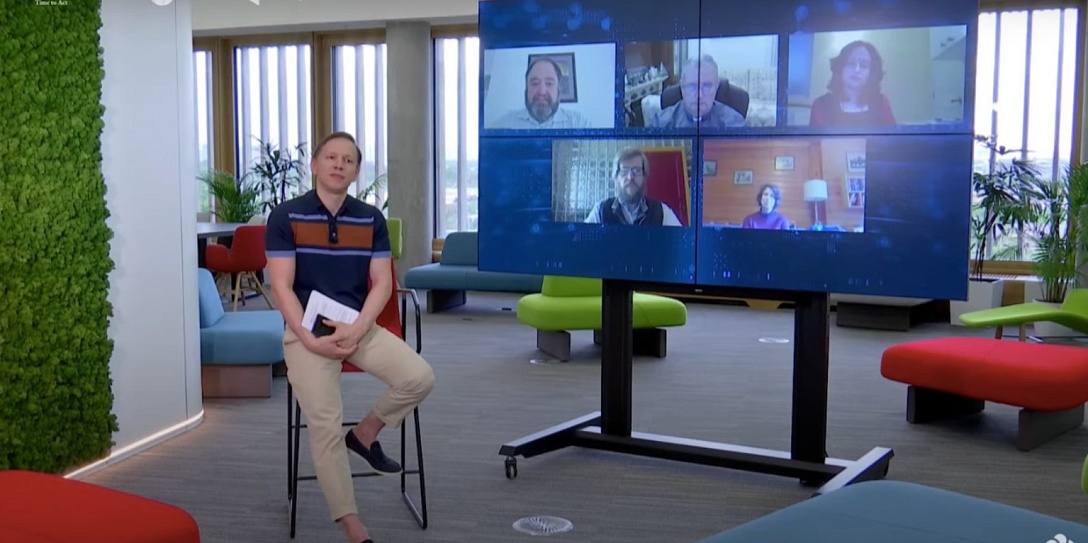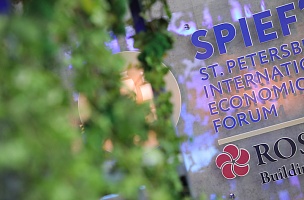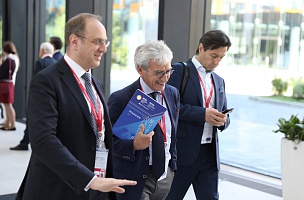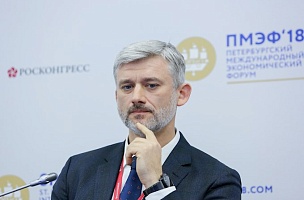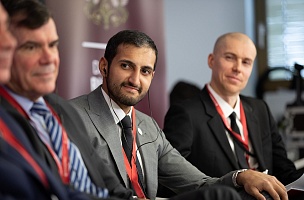Last week, a live discussion called «Quantum of the Future» was held on the official website and YouTube channel of the Roscongress Foundation. Organized by the Russian Quantum Center, the Roscongress Foundation and Rosatom, this online discussion aimed to find answers on how quantum technologies will help tackle certain global challenges.
Speakers at the first online discussion included: Ekaterina Solntseva — Chief Digital Officer at State Atomic Energy Corporation Rosatom; Urbasi Sinha — an advocate for the launch of India’s USD 1.12 billion quantum programme, professor at the Raman Research Institute (RRI) in India; Boris Altshuler — senior quantum technology consultant for Google and professor at the department of physics at Columbia University; Gianfranco Basti — Professor of philosophy of nature and science at the Pontifical Lateran University in Italy; Fyodor Lukyanov — Research director at the Valdai Discussion Club and chief editor of Russia in Global Affairs Journal. Ruslan Yunusov, who is heading Rosatom’s project to build a quantum computer in Russia, moderated the event.
Ekaterina Solntseva answered the first question of the discussion: why do Rosatom and Russia need a quantum computer in the first place? According to her, the need to create new materials for the nuclear industry has led to the fact that the state corporation has grown a separate area of work dedicated to this task. «We are developing new materials for the aviation and chemical industries, and we understand that this is just the class of tasks that a quantum computer can perform.» The expert also noted the areas of nuclear medicine and optimization of logistics when planning the routes of nuclear icebreakers on the Northern Sea Route as promising areas in which the quantum computer would be particularly useful.
«It is important that we want to work out the possibility of pilot calculations on tasks that are very close to real ones. That is, in addition to the development of hardware, we concerned ourselves with the task of developing quantum algorithms. Hopefully we will be able to apply them in real practice in a wide range of industries in the future,» said Ekaterina Solntseva, Chief Digital Officer at State Atomic Energy Corporation Rosatom.
Ruslan Yunusov stressed that the experience of other countries was taken into account when creating the current «Quantum technologies» roadmap within the framework of the «Digital economy» national program in Russia. In this regard, a guest expert from India, Urbasi Sinha, spoke about how the strategy for developing a quantum computer has been applied in her country. She noted that the roadmap in India has also already been put into operation and some of its stages are currently being implemented.
«We have a certain scheme of inviting scientists to work [on the creation of the quantum computer]. We try to implement the patterns that already exist in the quantum research program and provide our colleagues with good opportunities and resources so that they are happy to participate in the industry and help develop the quantum ecosystem,» said RRI Professor Urbasi Sinha.
Google launched their quantum computer development program five years ago, and it owes this rapid pace to the synergy of research and development. This was confirmed by the quantum consultant of the company Boris Altshuler.
«The interaction of universities and the industry has made a huge contribution, at least in the United States, to the development of [quantum] technologies, and we owe much of what we have now to this cooperation. The big advantage was that people from fundamental science interacted with people from engineering. What is happening now is completely different. A group was formed at Google (and at IBM, too), which, on the one hand, is involved in creating something specific, and on the other hand, what they are doing is, both in terms of methods and the way the question is posed, fundamental science. And there is a big difference, and it makes it so interesting to work there,» said Google’s senior quantum technology consultant Boris Altshuler.
The expert noted that today’s idea of quantum computers is similar to the idea of an ordinary computer at the dawn of its existence — in the sense that one can realize the potential of such a revolutionary invention only in retrospect. «In the early 70s, people at IBM made a personal computer, showed it to management, and their superiors decided that they did not need to make a product out of it, because no one would need it. Supposedly, there were no tasks that such a thing could solve, and no one would buy it. Now we really understand that if there had been no personal computers, there would be no Internet, and the world would be completely different. But back then even the people who made the PC couldn’t tell their management about the Internet, it just didn’t occur to them. I think what is happening now with a quantum computer is very similar,» he concluded.
The complete recording of the first discussion is available on The Roscongress Foundation’s official YouTube channel. Key points are listed on the Foundation’s official website in the Analytics section.
The following online discussion is scheduled to take place 11th June; the experts will weigh on the topic of quantum cryptography and fully protected communication.
The Roscongress Foundation — a socially oriented non-financial development institution and a major organizer of international conventions; exhibitions; and sporting, public, and cultural events.
The Foundation was established in 2007 with the aim of facilitating the development of Russia’s economic potential, promoting its national interests, and strengthening the country’s image. One of the roles of the Foundation is to comprehensively evaluate, analyse, and cover issues on the Russian and global economic agendas. It also offers administrative services, provides promotional support for business projects and attracting investment, and helps foster social entrepreneurship and charitable initiatives.
Each year, the Foundation’s events draw participants from 208 countries and territories, with more than 15,000 media representatives working on-site at Roscongress’ various venues. The Foundation benefits from analytical and professional expertise provided by 2,500 people working in Russia and abroad. In addition, it works in close cooperation with 122 economic partners; industrialists’ and entrepreneurs’ unions; and financial, trade, and business associations from 69 countries worldwide. roscongress.org
The Russian Quantum Center (RQC) is a unique for Russia non-profit science and technology center that in a short time has taken leading positions in its field of research, as well as in the development of high-tech commercial products based on quantum technologies. The RQC research team consists of 150+ scientists, including leading Russian and international experts. Over the 10 years of its existence, the RQC has formed 16 research groups and seven technology startups, built 16 labs, organized and held five major international conferences, founded three research schools. The RQC launched world’s first quantum blockchain in 2018 and is now building a quantum computer in cooperation with State Atomic Energy Corporation Rosatom.
State Atomic Energy Corporation Rosatom or ROSATOM is one the global technological leaders. It is a multi-industry holding comprising assets in power engineering, machine engineering and construction, among others. Having competencies across the entire nuclear fuel cycle, the corporation boasts the largest foreign project portfolio in the world with 36 power units at different stages of implementation in 12 countries. ROSATOM is the largest producer of electricity in Russia, ensuring over 19% of the country’s energy needs. ROSATOM also ventures into manufacturing equipment and isotopes for nuclear medicine, does research, materials studies, digital products, manufactures various innovative nuclear and non-nuclear products. ROSATOM is engaged into low-carbon generation, including wind energy. The corporation includes over 350 enterprises and organizations employing a total of about 250,00 people.


